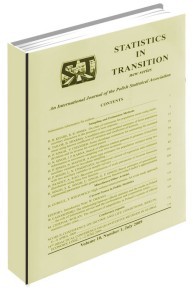Conceptualizing Subjective Well-being and its Many Offensionis - Implications for Data Collection in Official Statistics and for Policy Relevance
Conceptualizing Subjective Well-being and its Many Offensionis - Implications for Data Collection in Official Statistics and for Policy Relevance
Author(s): Christopher Mackie, Conal SmithSubject(s): Economy, ICT Information and Communications Technologies
Published by: Główny Urząd Statystyczny
Keywords: subjective well-being;national statistics;policy
Summary/Abstract: Subjective well-being encompasses several distinct but interacting aspects of people’s feelings, attitudes, and experiences. This paper assesses the state of the art for measuring these dimensions of people's lives, which typically involves analyzing self-reports of subjective well-being collected in survey instruments; however, other potentially complementary, technology-driven tools are emerging as well. We first answer the question, “what is subjective well-being?” and unpack its multidimensionality. The role of national statistics offices in measuring subjective well-being and deriving official statistics is considered next. We conclude by discussing how different characteristics of well-being constructs shape their applicability to policy. The overarching conclusion is that–while methodological limitations are present and a number of fundamental research challenges remain–understanding of how to collect and interpret data on subjective well-being has made enormous strides in the last two decades, and policies for a wide range of domains are beginning to be usefully informed.
Journal: Statistics in Transition. New Series
- Issue Year: 16/2015
- Issue No: 3
- Page Range: 335-372
- Page Count: 38
- Language: English

